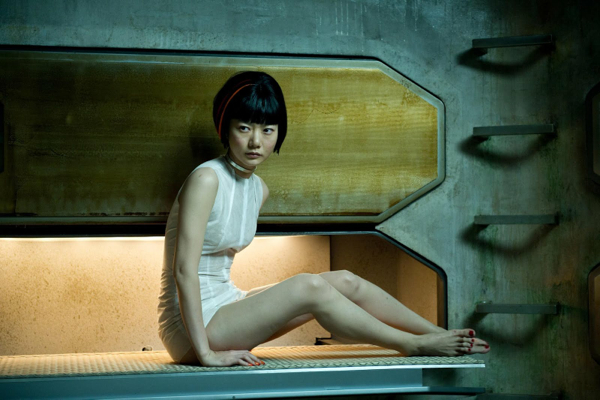Movie review by Greg Carlson
For the defense, “Cloud Atlas” has enough ambition for a few lifetimes of storytelling, but ambition does not make a great movie – or in this case, even a mediocre one. The adaptation of David Mitchell’s cult novel, a dreamy, puzzling mash-up of period and science fiction, is ideally suited to the talents of the Wachowskis and Tom Tykwer, filmmakers whose greatest successes have dealt with epistemological pretzels, philosophical synchronicities, and the elasticity of time. “Cloud Atlas” slices up and cross-cuts among six interconnected narratives that cover a span beginning in the 19th century and stretching to a post-apocalyptic future the world has yet to experience.
In a 2004 review for “The Telegraph” critic Theo Tait wrote that Mitchell’s novel, “spends half its time wanting to the be The Simpsons and the other half The Bible.” The film retains those lurching shifts in tone, and they are even less successful on the screen. “Cloud Atlas” pinballs from the broad slapstick farce of a nursing home breakout to the somber melodrama of a doomed love affair between a vagabond composer and a future atomic scientist. One intention of the book, less apparent in the movie, is to address a variety of well-worn genres via the self-acknowledgment of metafiction, but the technique fails on film because the directors deliver a product that is, as Karina Longworth so aptly points out, “totally lacking in self-awareness.”
“Cloud Atlas” surely wants to communicate something profound about the human animal’s tendency toward destruction through the way we mistreat one another, but a motif exploring cannibalism, like so many others things in the film, is variously treated as a joke (the morbid humor of a rascal collecting teeth on a beach once used as a “cannibals’ banqueting hall” and later, a flip shout-out to “Soylent Green”) and a matter of grave import (the rather horseshit revelation scene in which a servant “fabricant” is shocked to learn that her fellow clones are kept nourished by unwittingly consuming one another). The weak are meat the strong, and apparently the slave class, do eat.
For a fiction in which the structure is designed to replicate a musical composition and a major thematic link involving the sextet of the title, “Cloud Atlas” desperately needs a grander score than the one provided by co-director Tykwer and his regular cohorts Reinhold Heil and Johnny Klimek. What should be critical, indispensable material is forgotten the moment it is played. Additionally, the pulsating, techno-reprise of essentially the same lines Tykwer and company wrote for “Run Lola Run” does not help a clumsy 1970s thriller homage when Halle Berry’s investigative journalist Luisa Rey is on the run from an assassin on the streets of San Francisco.
Alongside Berry, stars Tom Hanks, Hugh Grant, Jim Broadbent, Jim Sturgess, Ben Whishaw, James D’Arcy, Keith David, and Doona Bae all play multiple roles across the various sections. Most of their accents and prosthetic makeup effects are so ridiculous, one wonders if the rubber Halloween mask looks were done on purpose. A flap over the ill-advised use of so-called “yellowface” resulted in a somewhat weird defense from the moviemakers, but the visual evidence is nasty no matter how you feel about actors playing other races. Instead of sub-titling an alien language, the infantile pidgin patois (the truth is the “true true” and a great distance is the “far far”) spoken by the Hawaii-dwelling Valleysmen tribe in the long-away future is as gross as anything that dribbled out of Jar Jar Binks’ snout.
For a movie from the creators of “The Matrix,” the staging of the laser gun shootouts in the Neo Seoul sequences set in the year 2144 look like they are taking place in slow motion and underwater, and not in that cool “bullet time” way. As Jim Sturgess rolls around the hood of his hovercraft to trade fire with a bunch of black-clad ninja stormtroopers, the thought may cross your mind that you have probably seen student films with better fight choreography. The Wachowskis should be in clover with this stuff, but the scenes featuring Bae as revolution inspiration and future deity Sonmi-451 merely contribute to the status of “Cloud Atlas” as the umpteenth failed “Blade Runner” larceny.
